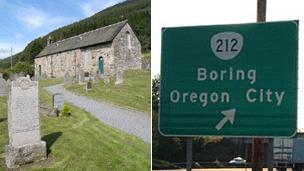Boring in Oregon votes to pair with Dull in Perthshire
- Published

Dull in Perthshire approached Boring in Oregon about forming a partnership
The US town of Boring in Oregon has voted in favour of "pairing" with the village of Dull in Perthshire.
Boring decided for the move in the interests of trans-Atlantic relations, tourism and humour, after being approached by residents in Dull.
The decision means both places can sell novelty tourist items, get quirky road signs made and plan exchange visits.
The difference in size between Boring and Dull meant they could not officially become twin towns.
Boring has a population of 12,000 while Dull is a tiny village.
The Boring Community Planning Council voted in favour of a "declaration of pairing" after being approached by the Dull Women's Book Club.
The BBC's Alastair Leithead in Los Angeles says both settlements profess to be much more interesting than they sound - and are keen to cash in on inquisitive tourists.
The Dull and Weem Community Council intends to mark the partnership with a new road sign and a street party on 23 June.
'Stop for photos'
Community council chairwoman Marjorie Keddie has said the party would show "that we are neither dull or boring".
Mrs Keddie added: "We are also excited at the prospect of a new road sign, which will say something like 'Dull, in association with Boring' or 'in sisterhood with Boring'.
Boring's Steve Bates tells BBC Radio 5 live why they linked up with Dull
"I'm sure it will stop a few people in their tracks for photos."
"Extra tourism is the main reason we're doing this, as most of the businesses here are holiday homes and lodges."
The potential link between the two locations was the brainchild of Perthshire resident Elizabeth Leighton, who passed through Boring while on a cycling holiday.
Boring was named after William H Boring, an early resident of the area and former Union soldier in the American Civil War.
Dull's name is thought to have come from the Gaelic word for meadow, but others have speculated it could be connected to the Gaelic word "dul" meaning snare.
- Published5 June 2012
- Published24 April 2012